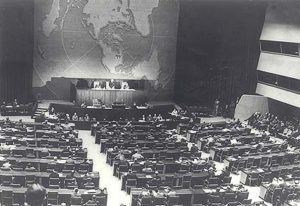The Arab Rejection, NY Herald Tribune, May 27, 1948.
 Click here to view the original article.
Click here to view the original article.
The Arab nations have, in effect, rejected the United Nations appeal for a cease-fire in Palestine. True, their reply was not worded as an outright rejection. The conditions stipulated were, however, so extreme that they could obviously not have been accepted by the Jews or, for that matter, by the United Nations. The very fact that any conditions were made amounts to a rejection, since the Security Council had demanded an unconditional truce.
This places the Arabs on very difficult moral ground. The Jews had already agreed to respect the cease-fire if their enemies did likewise. The Security Council, having been defied by the Arab states, is now in a good position to take action against them. It should immediately direct all members of the United Nations to desist from giving further military or economic aid to the countries that have refused to observe the cease-fire.
Such a resolution would affect primarily or exclusively Great Britain. It is unlikely that it would be ignored. There has already been strong criticism in the British Parliament and in the press of the participation in the Palestine war of British officers in the Arab Legion. The Foreign Office has been reported considering their withdrawal. But yesterday Mr. Bevin reiterated in the Commons his intention not to do so except in accordance with a United Nations resolution. Such a resolution is therefore needed for this reason, if for no other.
A second urgent need is for areola Anglo-American understanding on Palestine policy. The discussions recently undertaken to this end in London and Washington seemed at first to hold some promise, but they have borne no visible fruit. It may be that they were torpedoed by Mr. Truman’s remark-reported by Mr. Weizmann and so far not denied-that there would be no trouble about an American loan to Israel for military purposes. The British are right in calling this promise “ill-timed” and “unfortunate.” It is also, we regret to say, characteristic.
But the ineptness of American diplomacy cannot excuse the basic stupidity and futility of Britain’s imperial policy of supporting the Arab princes. It is hard to see why the British should believe that, at a time when they are withdrawing all their forces and relinquishing their responsibilities, they can succeed in a policy which was never a success when they had overwhelming military force in the area. It is even harder to understand why, in pursuit of such a policy, they should be willing to jeopardize the excellent British-American relations which have grown so close over the last ten years, and on which the peace and security of the free peoples of the world ultimately depend.



